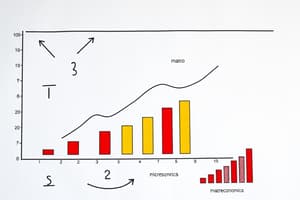Podcast
Questions and Answers
What is the primary focus of microeconomics?
What is the primary focus of microeconomics?
- Global economic trends
- Government spending
- Individual consumers and firms (correct)
- National income
Which of the following describes the concept of opportunity cost?
Which of the following describes the concept of opportunity cost?
- The amount of money needed to produce a good
- The total value of all goods produced
- The cost of making a choice in terms of the next best alternative forgone (correct)
- The price a consumer is willing to pay for a good
What characterizes a monopoly market structure?
What characterizes a monopoly market structure?
- Single seller controlling the entire market (correct)
- Many sellers with identical products
- Few sellers dominating the market
- Products are similar but differentiated
Which economic system prioritizes private ownership and free markets?
Which economic system prioritizes private ownership and free markets?
What is the definition of Gross Domestic Product (GDP)?
What is the definition of Gross Domestic Product (GDP)?
Which of the following best describes a mixed economy?
Which of the following best describes a mixed economy?
What does the unemployment rate measure?
What does the unemployment rate measure?
What does Keynesian economics advocate for?
What does Keynesian economics advocate for?
Flashcards are hidden until you start studying
Study Notes
Key Concepts in Economics
Definition
- Economics is the study of how individuals, businesses, and governments allocate scarce resources to satisfy their needs and wants.
Branches of Economics
-
Microeconomics
- Focuses on individual consumers and firms.
- Examines supply and demand, pricing, and consumer behavior.
-
Macroeconomics
- Studies the economy as a whole.
- Analyzes aggregate indicators such as GDP, unemployment rates, and national income.
Fundamental Principles
-
Scarcity
- Limited resources compared to unlimited wants; forces choices to be made.
-
Opportunity Cost
- The value of the next best alternative that is forgone when a choice is made.
-
Supply and Demand
- Supply: Quantity of a good/service that producers are willing to sell at various prices.
- Demand: Quantity consumers are willing to purchase at various prices.
- Equilibrium: Point where supply equals demand.
Economic Systems
-
Capitalism
- Private ownership and free markets.
- Profit motive drives production and distribution.
-
Socialism
- Government ownership or regulation of major industries.
- Emphasis on social welfare and distribution of wealth.
-
Mixed Economy
- Combination of capitalism and socialism.
- Both private enterprise and government involvement.
Key Economic Indicators
-
Gross Domestic Product (GDP)
- Total value of all goods and services produced in a country over a specific period.
-
Unemployment Rate
- Percentage of the labor force that is unemployed and actively seeking employment.
-
Inflation Rate
- Rate at which the general level of prices for goods and services is rising.
Market Structures
-
Perfect Competition
- Many buyers and sellers; identical products; no barriers to entry.
-
Monopoly
- Single seller controls the entire market; high barriers to entry.
-
Oligopoly
- Few sellers dominate the market; products can be identical or differentiated.
-
Monopolistic Competition
- Many sellers; products are similar but differentiated; some control over pricing.
Economic Theories
-
Classical Economics
- Emphasizes free markets and the self-regulating nature of the economy.
-
Keynesian Economics
- Advocates for government intervention to stabilize economic fluctuations.
-
Monetarism
- Focus on the role of governments in controlling the amount of money in circulation.
Global Economics
-
International Trade
- Exchange of goods and services across international borders.
- Comparative advantage: Countries should specialize in producing goods they can provide most efficiently.
-
Globalization
- Increased interconnectedness of economies around the world.
- Benefits include efficiency and access to resources, while challenges include inequality and dependency.
Fiscal and Monetary Policy
-
Fiscal Policy
- Government spending and tax policies used to influence economic conditions.
-
Monetary Policy
- Central bank actions that manage the money supply and interest rates to control inflation and stabilize the economy.
Definition of Economics
- Economics is the study of how resources are allocated to satisfy wants and needs.
Branches of Economics
- Microeconomics: focuses on individual consumers and firms
- Macroeconomics: studies the economy as a whole
Fundamental Principles
- Scarcity: resources are limited compared to unlimited wants, leading to choices
- Opportunity Cost: value of the next best alternative forgone when a choice is made
- Supply and Demand: supply is the amount producers are willing to sell at a given price, while demand is the amount consumers are willing to buy at a given price; equilibrium occurs when supply equals demand
Economic Systems
- Capitalism: private ownership and free markets, driven by profit motive
- Socialism: government ownership or regulation of major industries, focusing on social welfare and wealth distribution
- Mixed Economy: combination of capitalism and socialism with both private enterprise and government involvement
Key Economic Indicators
- Gross Domestic Product (GDP): total value of goods and services produced within a country in a specific period
- Unemployment Rate: percentage of the labor force actively seeking employment but without a job
- Inflation Rate: rate of increase in the general price level for goods and services
Market Structures
- Perfect Competition: many buyers and sellers, identical products, no barriers to entry
- Monopoly: single seller controls the entire market, high barriers to entry
- Oligopoly: few sellers dominate the market, products can be identical or differentiated
- Monopolistic Competition: many sellers, similar but differentiated products, some control over pricing
Economic Theories
- Classical Economics: emphasizes free markets and self-regulation
- Keynesian Economics: advocates for government intervention to stabilize economic fluctuations
- Monetarism: focuses on controlling money supply to influence inflation and stabilize the economy
Global Economics
- International Trade: exchange of goods and services across borders, based on comparative advantage (specializing in what a country produces most efficiently)
- Globalization: increased interconnectedness of economies worldwide, offering benefits like efficiency and access to resources but also challenges such as inequality and dependency
Fiscal and Monetary Policy
- Fiscal Policy: government spending and tax policies used to influence economic conditions
- Monetary Policy: central bank actions managing the money supply and interest rates to control inflation and stabilize the economy
Studying That Suits You
Use AI to generate personalized quizzes and flashcards to suit your learning preferences.




